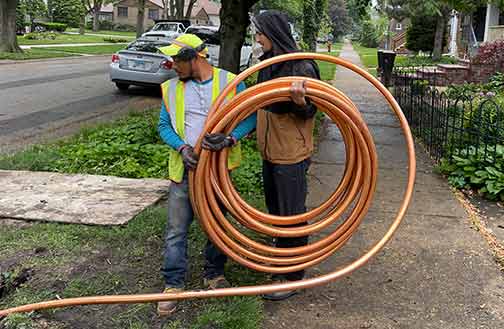The city of Chicago, like many metropolitan areas around the world, faces the ongoing challenge of maintaining and upgrading its infrastructure to meet the demands of a growing population. One crucial aspect of this infrastructure is the water supply system, which currently serves millions of residents and businesses throughout the city.
In recent years, there has been a significant focus on replacing and upgrading the aging water supply lines in Chicago. These replacement projects are necessary to ensure the availability of safe and reliable water for future generations. In this article, we will explore the importance of these projects and their impact on the residents, businesses, and overall development of the city.
The Need for Water Supply Line Replacement
The existing water supply lines in Chicago were primarily constructed several decades ago when the population was significantly smaller. Over time, these pipelines have deteriorated due to natural wear and tear, leading to leaks, bursts, and reduced water quality. The need for replacement has become increasingly urgent due to the following reasons:
- Infrastructure Aging: Many of the water supply lines in Chicago have reached or exceeded their intended lifespan. As a result, they are more susceptible to failures and require frequent repairs, leading to inconvenience for residents and costly maintenance work for the city.
- Water Quality Concerns: The aging infrastructure can contribute to water quality issues, including discoloration and contamination. This poses a risk to public health and impacts the city’s ability to comply with stringent water quality standards.
- Population Growth: Chicago’s population has been steadily increasing, placing greater stress on the existing water supply infrastructure. To meet the current and future demands of residents, businesses, and industries, the system must be upgraded and expanded.
Water Supply Line Replacement Projects in Chicago
The City of Chicago has recognized the critical need for water supply line replacement and has initiated several projects to address this issue. These projects are ambitious in scope and aim to modernize the water supply system while minimizing disruptions to residents and businesses. Let’s take a closer look at some of the key projects:
1. Chicago Water Main Replacement Program
The Chicago Water Main Replacement Program is a comprehensive initiative aimed at replacing aging water mains throughout the city. This program focuses on prioritizing areas with the highest break rates and those that have experienced recurring issues related to water quality.
The primary objectives of the Chicago Water Main Replacement Program are:
- Improving the reliability and resiliency of the water supply system by replacing aging infrastructure.
- Enhancing water quality by eliminating sources of contamination and reducing the occurrence of discoloration.
- Minimizing disruptions to residents and businesses by using innovative construction techniques and efficient project management.
- Adopting sustainable practices in construction to minimize environmental impacts.
The program is being implemented in phases, and the City of Chicago is working closely with contractors, engineers, and community stakeholders to ensure successful completion.
2. Tunnel and Reservoir Plan (TARP)
The Tunnel and Reservoir Plan (TARP), also known as the “Deep Tunnel” project, is one of the largest and most ambitious water supply infrastructure projects in Chicago’s history. The TARP aims to address the city’s combined sewer overflow and flooding issues by constructing a network of tunnels and reservoirs to capture and store stormwater.
This project has a direct impact on the water supply system as it helps alleviate stress on existing pipelines caused by heavy rainfall and storm events. By reducing the risk of sewer backups and overflows, the TARP indirectly protects the integrity and functionality of the water supply lines.
Impact on Residents and Businesses
The replacement and upgrade of water supply lines in Chicago have both short-term and long-term impacts on residents and businesses alike. While these projects may cause temporary inconveniences, the benefits far outweigh the temporary disruptions. Let’s discuss the impact in more detail:
1. Improved Water Quality
One of the most significant benefits of the water supply line replacement projects is the improvement in water quality. By replacing aging pipelines, the city can eliminate sources of contamination and reduce the occurrence of discoloration and other water quality issues. This ensures that residents have access to clean and safe drinking water, which is crucial for their health and well-being.
2. Enhanced Reliability
The replacement projects aim to enhance the reliability of the water supply system. By replacing aging infrastructure prone to leaks and bursts, the city can minimize disruptions in water supply and reduce the need for emergency repairs. This is particularly important during extreme weather events or other emergencies when a consistent water supply is critical for the community.
3. Economic Development
The reliable availability of water is essential for economic development in any city. By upgrading and expanding the water supply infrastructure, Chicago can attract new businesses and support existing industries. Reliable access to water is crucial for manufacturing, hospitality, healthcare, and numerous other sectors. The replacement projects contribute to creating a conducive environment for economic growth and job creation.
4. Environmental Benefits
The water supply line replacement projects in Chicago also have positive environmental impacts. As the new pipelines are installed, more efficient technology and materials can be utilized, resulting in reduced water loss due to leaks and improved water conservation. Furthermore, the Tunnel and Reservoir Plan (TARP) helps prevent sewer overflows and reduces pollution in local water bodies, leading to a healthier and cleaner environment for both residents and wildlife.
Conclusion
The water supply line replacement projects in Chicago are crucial for the city’s future. By addressing the challenges posed by aging infrastructure, these projects ensure a reliable water supply for residents and businesses while enhancing water quality and reducing environmental impacts. While there may be temporary inconveniences during construction, the long-term benefits far outweigh the short-term disruptions. The City of Chicago, along with its partners and stakeholders, remains committed to completing these projects successfully and securing a sustainable water supply for generations to come.
